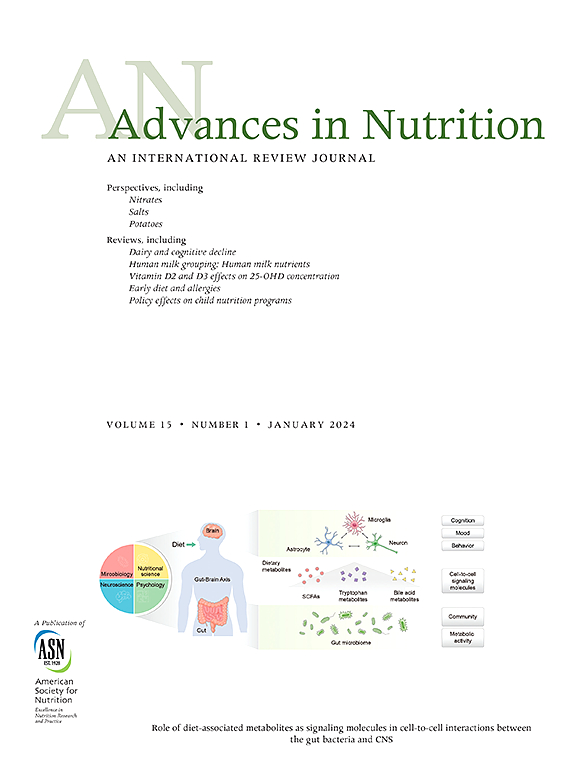大豆异黄酮对雌激素测量的影响:随机对照试验的系统回顾和荟萃分析。
IF 9.2
1区 医学
Q1 NUTRITION & DIETETICS
引用次数: 0
摘要
背景:尽管有人建议增加植物性食物的摄入量以促进公众和地球健康,而且大豆食品在以植物为主的膳食中可以发挥作用,但围绕大豆食品,尤其是大豆异黄酮功效的争议阻碍了人们对其的摄入。鉴于大豆异黄酮具有保护心脏的作用并能缓解更年期症状,解决这些问题对女性尤为重要:本研究对随机对照试验进行了系统回顾和荟萃分析,旨在确定大豆异黄酮对绝经后女性雌激素水平的影响:方法:检索了MEDLINE、Embase和Cochrane图书馆截至2024年8月对绝经后妇女进行为期3个月的大豆异黄酮与非异黄酮对照的随机试验。研究结果包括子宫内膜厚度(ET)、阴道成熟指数(VMI)、卵泡刺激素(FSH)和雌二醇。独立作者提取了数据并评估了偏倚风险。GRADE(建议评估、制定和评价分级)用于评估证据的确定性:我们纳入了 40 项试验(52 项试验比较,n=3285),这些试验评估了大豆异黄酮替代非异黄酮对照组的中位剂量(75 毫克/天)在 24 周内的效果。大豆异黄酮对雌激素的任何指标都没有统计学意义上的显著影响;ET(平均差异,-0.22 毫米[95% 置信区间,-0.45,0.01mm],PMD=0.059)、VMI(2.31 [-2.14, 6.75],PMD=0.310)、FSH(-0.02IU/L [-2.39, 2.35IU/L],PMD=0.987)和雌二醇(1.61pmol/L [-1.17, 4.38pmol/L],PMD=0.256)。所有结果的证据确定性均为高到中等:目前的证据表明,与非异黄酮对照组相比,大豆异黄酮在绝经后妇女雌激素的 4 项指标上不表现出雌激素效应。这一综合结果证明,大豆异黄酮可能是一种选择性雌激素受体调节剂,在临床上不同于雌激素。解决公众健康问题可促进大豆食品成为对环境影响小、成本低的优质植物蛋白来源,尤其有利于绝经后妇女,并符合可持续膳食模式和指南:PROPRONO (CRD42023439239)。本文章由计算机程序翻译,如有差异,请以英文原文为准。
Effect of Soy Isoflavones on Measures of Estrogenicity: A Systematic Review and Meta-Analysis of Randomized Controlled Trials
Despite recommendations to increase plant food consumption for public and planetary health and the role that soy foods can play in plant-predominant diets, controversies around the effects of soy foods, especially soy isoflavones, are a barrier to their intake. Given their cardioprotective effects and ability to alleviate menopausal symptoms, addressing these concerns is particularly relevant to women. This systematic review and meta-analysis of randomized controlled trials aimed to determine the effect of soy isoflavones on measures of estrogenicity in postmenopausal women. MEDLINE, Embase, and Cochrane Library were searched through August 2024 for randomized trials 3-mo investigating soy isoflavones compared with non-isoflavone controls in postmenopausal women. Outcomes included endometrial thickness (ET), vaginal maturation index (VMI), follicle-stimulating hormone (FSH), and estradiol. Independent authors extracted data and assessed risk of bias. Grading of Recommendations, Assessment, Development and Evaluation was used to assess certainty of evidence. We included 40 trials (52 trial comparisons, n = 3285) assessing the effect of a median reported dose of 75 mg/d of soy isoflavones in substitution for non-isoflavone controls over a median of 24 wk. Soy isoflavones had no statistically significant effect on any measure of estrogenicity; ET [mean difference, –0.22 mm (95% confidence interval, –0.45, 0.01 mm), PMD = 0.059], VMI [2.31 (–2.14, 6.75), PMD = 0.310], FSH [–0.02 IU/L (–2.39, 2.35 IU/L), PMD = 0.987], and estradiol [1.61 pmol/L (–1.17, 4.38 pmol/L), PMD = 0.256]. The certainty of evidence was high to moderate for all outcomes. Current evidence suggests that soy isoflavones do not exhibit estrogenic effects compared with non-isoflavone controls on 4 measures of estrogenicity in postmenopausal women. This synthesis supports that soy isoflavones likely act as selective estrogen receptor modulators, differing clinically from the hormone estrogen. Addressing public health concerns may promote soy foods as high-quality plant protein sources with low environmental impact and cost, particularly benefiting postmenopausal women and aligning with sustainable dietary patterns and guidelines.
This study was registered in PROSPERO as CRD42023439239.
求助全文
通过发布文献求助,成功后即可免费获取论文全文。
去求助
来源期刊

Advances in Nutrition
医学-营养学
CiteScore
17.40
自引率
2.20%
发文量
117
审稿时长
56 days
期刊介绍:
Advances in Nutrition (AN/Adv Nutr) publishes focused reviews on pivotal findings and recent research across all domains relevant to nutritional scientists and biomedical researchers. This encompasses nutrition-related research spanning biochemical, molecular, and genetic studies using experimental animal models, domestic animals, and human subjects. The journal also emphasizes clinical nutrition, epidemiology and public health, and nutrition education. Review articles concentrate on recent progress rather than broad historical developments.
In addition to review articles, AN includes Perspectives, Letters to the Editor, and supplements. Supplement proposals require pre-approval by the editor before submission. The journal features reports and position papers from the American Society for Nutrition, summaries of major government and foundation reports, and Nutrient Information briefs providing crucial details about dietary requirements, food sources, deficiencies, and other essential nutrient information. All submissions with scientific content undergo peer review by the Editors or their designees prior to acceptance for publication.
 求助内容:
求助内容: 应助结果提醒方式:
应助结果提醒方式:


